九年级英语_知识点语法(单元归纳)
人教版九年级全一册英语Unit13单元语法知识点总结

人教版九年级全一册英语Unit13单元语法知识点总结本单元重点短语的具体用法1. at the bottom of the river:用于描述某物在河床底部的位置。
例如:The coin was found at the bottom of the river.(硬币在河床底部被发现。
)2. be full of the rubbish:表示充满了垃圾。
例如:The park is full of rubbish.(公园里充满了垃圾。
)3. throw litter into the river:意思是把垃圾扔入河中,用于描述一种不环保的行为。
例如:It's not good to throw litter into the river.(把垃圾扔入河中是不好的行为。
)4. play a part in cleaning it up:表示参与或在清理某物方面发挥作用。
例如:Everyone should play a part in cleaning up the environment.(每个人都应该参与清理环境。
)5. land pollution:指土地污染。
例如:Land pollution is a serious problem.(土地污染是一个严重的问题。
)6. fill the air with black smoke:用于描述使空气中充满黑烟的情况。
例如:The factory fills the air with black smoke.(工厂使空气中充满了黑烟。
)7. cut down air pollution:意思是减少空气污染。
例如:We need to cut down air pollution to protect our health.(我们需要减少空气污染来保护我们的健康。
)8. make a difference:表示产生影响或有所作为。
例如:Small actions can make a big difference.(小行动可以产生大影响。
九年级英语上册各单元知识点归纳

九年级英语上册各单元知识点归纳第一单元:基础知识1. 介词短语的使用:介词短语是由一个介词和它的宾语组成的短语,用来表示时间、地点、方向、原因等。
例如:"on the table"(在桌子上),"in the park"(在公园里)。
介词短语在句子中作状语、定语、宾语等。
需要注意介词与宾语之间的搭配。
2. 动词的时态和语态:英语中的动词有多种时态和语态。
常见的时态有一般现在时、一般过去时、一般将来时等。
常见的语态有主动语态和被动语态。
时态用于表示动作发生的时间,语态用于表示动作的执行者。
例如:"She is reading a book."(她正在读一本书)。
需要注意时态和语态的用法和变化规则。
3. 名词的单复数形式:英语中的名词有单数和复数形式。
复数形式一般是在名词后面加-s或-es。
有些名词的复数形式较特殊,需要记忆。
例如:"a cat"(一只猫)的复数形式是"cats"(多只猫)。
需要注意名词的单复数形式在句子中的搭配和用法。
第二单元:阅读理解1. 完型填空:完型填空是一种考察学生对语境理解和词汇运用能力的题型。
在完型填空中,通常给出一篇文章和一些空格,要求学生根据文章内容和语境选择正确的单词或短语填入空格中。
通常需要结合文章整体逻辑和上下文意义来填写正确答案。
2. 阅读理解题:阅读理解题是一种考察学生阅读理解能力和推理能力的题型。
通常会给出一篇短文或文章,然后根据文章内容提出一些问题,要求学生根据文章内容和推理来回答问题。
需要学会熟练阅读和理解文章,抓住关键信息和主题,并能运用推理等能力来回答问题。
第三单元:语法知识1. 直接引语和间接引语:在英语中,当我们引述别人的话时,可以使用直接引语和间接引语。
直接引语是直接引用别人所说的话,使用引号将其包围;间接引语是将别人所说的话转述出来。
例如:直接引语:"I am happy," she said.(她说:“我很开心。
人教版九年级全一册英语Unit4单元语法知识点总结
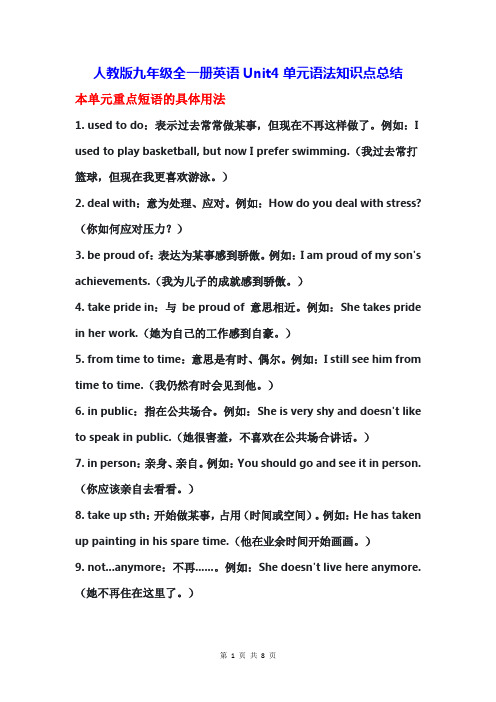
人教版九年级全一册英语Unit4单元语法知识点总结本单元重点短语的具体用法1. used to do:表示过去常常做某事,但现在不再这样做了。
例如:I used to play basketball, but now I prefer swimming.(我过去常打篮球,但现在我更喜欢游泳。
)2. deal with:意为处理、应对。
例如:How do you deal with stress?(你如何应对压力?)3. be proud of:表达为某事感到骄傲。
例如:I am proud of my son's achievements.(我为儿子的成就感到骄傲。
)4. take pride in:与be proud of 意思相近。
例如:She takes pride in her work.(她为自己的工作感到自豪。
)5. from time to time:意思是有时、偶尔。
例如:I still see him from time to time.(我仍然有时会见到他。
)6. in public:指在公共场合。
例如:She is very shy and doesn't like to speak in public.(她很害羞,不喜欢在公共场合讲话。
)7. in person:亲身、亲自。
例如:You should go and see it in person.(你应该亲自去看看。
)8. take up sth:开始做某事,占用(时间或空间)。
例如:He has taken up painting in his spare time.(他在业余时间开始画画。
)9. not...anymore:不再......。
例如:She doesn't live here anymore.(她不再住在这里了。
)10. worry about:担心、担忧。
例如:Don't worry about the exam, just do your best.(不要担心考试,尽力就好。
人教版九年级全一册英语Unit1单元语法知识点总结
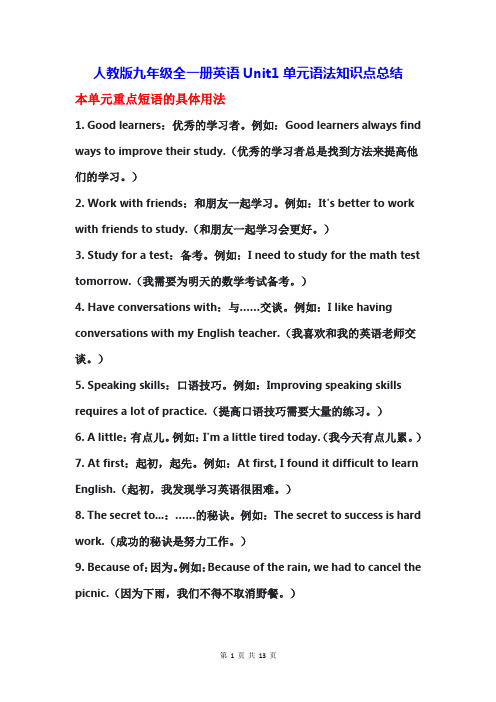
人教版九年级全一册英语Unit1单元语法知识点总结本单元重点短语的具体用法1. Good learners:优秀的学习者。
例如:Good learners always find ways to improve their study.(优秀的学习者总是找到方法来提高他们的学习。
)2. Work with friends:和朋友一起学习。
例如:It's better to work with friends to study.(和朋友一起学习会更好。
)3. Study for a test:备考。
例如:I need to study for the math test tomorrow.(我需要为明天的数学考试备考。
)4. Have conversations with:与……交谈。
例如:I like having conversations with my English teacher.(我喜欢和我的英语老师交谈。
)5. Speaking skills:口语技巧。
例如:Improving speaking skills requires a lot of practice.(提高口语技巧需要大量的练习。
)6. A little:有点儿。
例如:I'm a little tired today.(我今天有点儿累。
)7. At first:起初,起先。
例如:At first, I found it difficult to learn English.(起初,我发现学习英语很困难。
)8. The secret to...:……的秘诀。
例如:The secret to success is hard work.(成功的秘诀是努力工作。
)9. Because of:因为。
例如:Because of the rain, we had to cancel the picnic.(因为下雨,我们不得不取消野餐。
人教版初中英语九年级全册各单元知识点、语法归纳整理
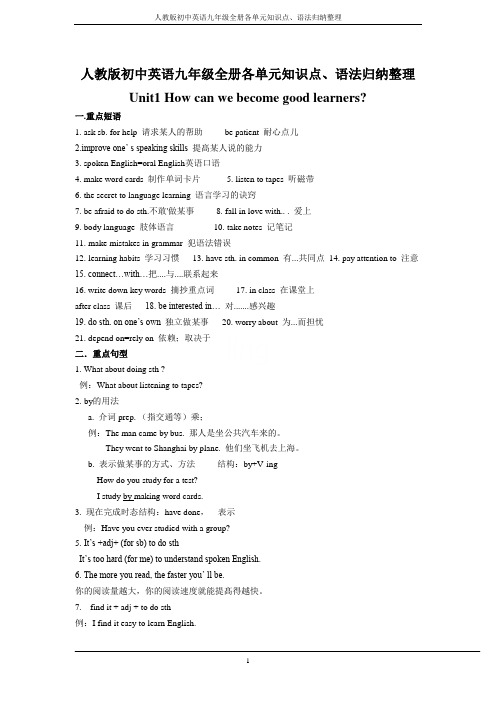
人教版初中英语九年级全册各单元知识点、语法归纳整理Unit1 How can we become good learners?一.重点短语1. ask sb. for help 请求某人的帮助be patient 耐心点儿2.improve one’ s speaking skills 提髙某人说的能力3. spoken English=oral English英语口语4. make word cards 制作单词卡片5. listen to tapes 听磁带6. the secret to language learning 语言学习的诀窍7. be afraid to do sth.不敢'做某事8. fall in love with.. . 爱上9. body language 肢体语言10. take notes 记笔记11.make mistakes in grammar 犯语法错误12.learning habits 学习习惯13. have sth. in common 有...共同点14. pay attention to 注意15. connect…with…把....与....联系起来16. write down key words 摘抄重点词17. in class 在课堂上after class 课后18. be interested in… 对.......感兴趣19. do sth. on one’s own 独立做某事20. worry about 为...而担忧21. depend on=rely on 依赖;取决于二.重点句型1. What about doing sth ?例:What about listening to tapes?2.by的用法a. 介词 prep. (指交通等)乘;例:The man came by bus. 那人是坐公共汽车来的。
九年级第四单元英语知识点

九年级第四单元英语知识点本文将为大家介绍九年级第四单元的英语知识点,包括语法、词汇、听力和阅读等方面,帮助同学们更好地掌握相关内容。
一、语法知识点1. 直接引语和间接引语直接引语是直接转述他人的话语,用引号括起来;间接引语是将别人的话转述成自己的话。
例如:直接引语:She said, "I like playing basketball."间接引语:She said that she liked playing basketball.2. 虚拟语气虚拟语气用来表示非真实的情况或假设的情况,包括虚拟条件句和虚拟语气的用法。
例如:虚拟条件句:If I were you, I would go.虚拟语气的用法:It's time you went to bed.3. 定语从句定语从句用来修饰前面的名词或代词,起修饰作用。
例如:The boy who is reading a book is my brother.二、词汇知识点1. 同义词与反义词同义词是指意思相同或相近的词语,可以丰富文章表达;反义词是指意思相反的词语,可以对比强调差异。
例如:同义词:start - begin; happy - joyful反义词:hot - cold; big - small2. 词组与短语词组是由多个词语组成,一起使用形成固定表达的组合;短语是由多个单词组成,整体含义比单个词或词组更具体。
例如:词组:take care of; look forward to短语:pull oneself together; break the ice三、听力技巧1. 注意听力材料中的关键词关键词可以帮助我们更好地理解材料的重点和要点,提高听力效果。
例如:听到对话中的"tomorrow",可以判断谈论的时间范围是明天。
2. 练习听力的常见方式多听英语材料,如英语歌曲、英语电影、英语广播等,逐渐提高对英语语音和语调的理解能力。
人教版九年级全一册英语Unit3单元语法知识点总结
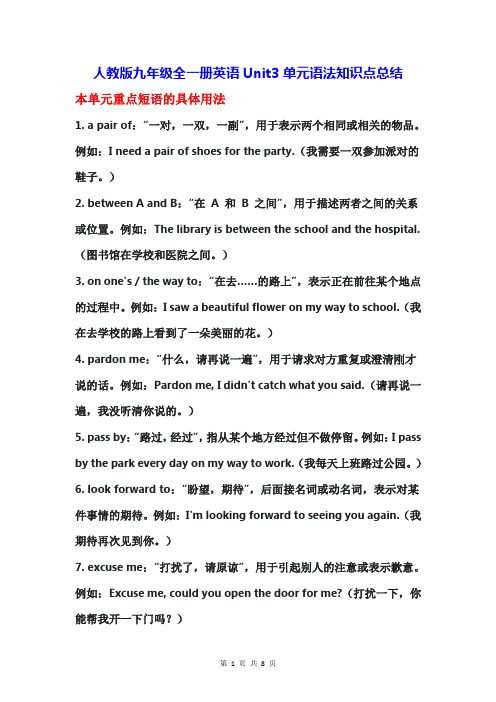
人教版九年级全一册英语Unit3单元语法知识点总结本单元重点短语的具体用法1. a pair of:“一对,一双,一副”,用于表示两个相同或相关的物品。
例如:I need a pair of shoes for the party.(我需要一双参加派对的鞋子。
)2. between A and B:“在A 和B 之间”,用于描述两者之间的关系或位置。
例如:The library is between the school and the hospital.(图书馆在学校和医院之间。
)3. on one's / the way to:“在去……的路上”,表示正在前往某个地点的过程中。
例如:I saw a beautiful flower on my way to school.(我在去学校的路上看到了一朵美丽的花。
)4. pardon me:“什么,请再说一遍”,用于请求对方重复或澄清刚才说的话。
例如:Pardon me, I didn't catch what you said.(请再说一遍,我没听清你说的。
)5. pass by:“路过,经过”,指从某个地方经过但不做停留。
例如:I pass by the park every day on my way to work.(我每天上班路过公园。
)6. look forward to:“盼望,期待”,后面接名词或动名词,表示对某件事情的期待。
例如:I'm looking forward to seeing you again.(我期待再次见到你。
)7. excuse me:“打扰了,请原谅”,用于引起别人的注意或表示歉意。
例如:Excuse me, could you open the door for me?(打扰一下,你能帮我开一下门吗?)8. get some information about:“获取有关……的一些信息”,用于表示获取关于某个主题的信息。
九年级英语第1单元-知识点总结

九年级英语第1单元-知识点总结第一部分:基础词汇和短语1. Greetings and Introductions在英语中,问候和介绍是日常生活中常用到的交际用语。
常见的问候方式包括:“Hello!”、“Hi!”、“Goodmorning/afternoon/evening!”等。
而自我介绍的常用表达为“I am...”、“My name is...”等。
2. Classroom English在教室里,学生和老师之间的交流需要使用一些特定的英语表达。
例如,“May I come in?”、“May I go to the washroom?”、“Can you repeat that, please?”等。
3. Numbers and Dates数字和日期是我们日常生活中无法绕开的内容。
需要掌握基本的数字、基数词、序数词等,以及日期的表达,例如“Today is...”、“It's Monday.”、“My birthday is on October 15th.”等。
4. Time谈论时间也是英语学习的重要内容,掌握“in themorning/afternoon/evening”、“at 9 o'clock”、“from...to...”等表达方式非常实用。
5. School Subjects and Facilities学校科目和设施是我们在学校中经常需要提及的。
诸如“Mathematics”、“Science”、“Library”、“Computer lab”等词汇需要熟练掌握。
6. Adjectives and Adverbs形容词和副词是用来描述人、事物和行为的重要词汇。
例如“beautiful”、“kind”、“quickly”、“carefully”等。
第二部分:语法知识点1. Simple Present Tense学习现在时态是英语学习的基础。
在这一时态中,主语和动词的形式要保持一致,例如“I play football.”、“He dances well.”。
人教版九年级全一册英语Unit12单元语法知识点总结
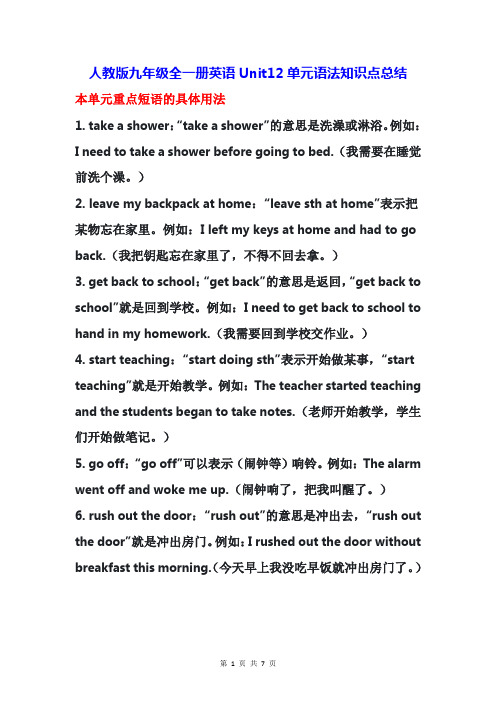
人教版九年级全一册英语Unit12单元语法知识点总结本单元重点短语的具体用法1. take a shower:“take a shower”的意思是洗澡或淋浴。
例如:I need to take a shower before going to bed.(我需要在睡觉前洗个澡。
)2. leave my backpack at home:“leave sth at home”表示把某物忘在家里。
例如:I left my keys at home and had to go back.(我把钥匙忘在家里了,不得不回去拿。
)3. get back to school:“get back”的意思是返回,“get back to school”就是回到学校。
例如:I need to get back to school to hand in my homework.(我需要回到学校交作业。
)4. start teaching:“start doing sth”表示开始做某事,“start teaching”就是开始教学。
例如:The teacher started teaching and the students began to take notes.(老师开始教学,学生们开始做笔记。
)5. go off:“go off”可以表示(闹钟等)响铃。
例如:The alarm went off and woke me up.(闹钟响了,把我叫醒了。
)6. rush out the door:“rush out”的意思是冲出去,“rush out the door”就是冲出房门。
例如:I rushed out the door without breakfast this morning.(今天早上我没吃早饭就冲出房门了。
)7. give sb a lift:“give sb a lift”的意思是让某人搭车、捎某人一程。
九年级十三单元英语知识点

九年级十三单元英语知识点一、语法知识点1. 定语从句:定语从句用来修饰名词或代词,提供更多的相关信息。
关系代词(who, whom, whose, which, that)或关系副词(when, where, how)可以引导定语从句。
例如:- This is the book that I borrowed from the library.- The boy who is playing the piano is my cousin.2. 虚拟语气:虚拟语气用于表示假设、愿望、命令等非真实情况。
主要包括虚拟条件句和虚拟语气的用法。
例如:- If I were you, I would study harder.- I wish I could visit Paris one day.3. 倒装句:倒装句是指把句子的主语和谓语动词调换位置。
一般存在两种情况:完全倒装和部分倒装。
倒装句主要用于强调或改变句子结构。
例如:- Not only did he pass the exam, but he also got the highest score.- In no way can she solve the problem by herself.二、词汇与短语1. 口语交际用语:九年级的学生需要掌握一些日常生活交际用语,例如问候、道歉、道谢、请求等。
这些常用的口语表达能够帮助学生更流利地进行日常对话。
2. 多义词与同义词:在英语中,很多词汇存在多种义项,或者有相似的意思。
学生需要学会根据上下文的意思来正确理解词汇的意思,避免产生歧义。
例如:- The bank is on the left.- I left my bag on the table.3. 词形变化:学生需要学会动词的时态变化、名词的复数形式、形容词的比较级和最高级形式等。
这些词形变化能够帮助提高学生的语言表达能力。
三、阅读技巧1. 猜词义:当学生遇到不认识的单词时,可以通过上下文来猜测其意思。
人教版九年级全一册英语Unit11单元语法知识点总结
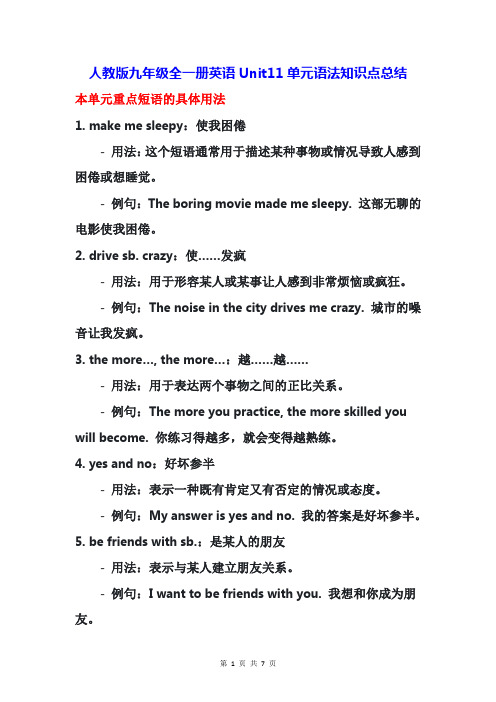
人教版九年级全一册英语Unit11单元语法知识点总结本单元重点短语的具体用法1. make me sleepy:使我困倦- 用法:这个短语通常用于描述某种事物或情况导致人感到困倦或想睡觉。
- 例句:The boring movie made me sleepy. 这部无聊的电影使我困倦。
2. drive sb. crazy:使……发疯- 用法:用于形容某人或某事让人感到非常烦恼或疯狂。
- 例句:The noise in the city drives me crazy. 城市的噪音让我发疯。
3. the more…, the more…:越……越……- 用法:用于表达两个事物之间的正比关系。
- 例句:The more you practice, the more skilled you will become. 你练习得越多,就会变得越熟练。
4. yes and no:好坏参半- 用法:表示一种既有肯定又有否定的情况或态度。
- 例句:My answer is yes and no. 我的答案是好坏参半。
5. be friends with sb.:是某人的朋友- 用法:表示与某人建立朋友关系。
- 例句:I want to be friends with you. 我想和你成为朋友。
6. feel left out:感觉被忽视- 用法:描述某人感到被冷落或排除在某个群体之外。
- 例句:I always feel left out in group activities. 在团队活动中,我总是感觉被忽视。
7. sleep badly:睡眠很差- 用法:形容睡眠质量不好。
- 例句:I slept badly last night. 昨晚我睡眠很差。
8. don't feel like eating:不想吃东西- 用法:表示没有食欲或不想吃东西。
- 例句:I don't feel like eating anything today. 今天我不想吃东西。
九年级英语知识点归纳第一单元

第一单元是九年级英语中的重要知识点。
以下是对这一单元重点知识的归纳总结,包括语法、词汇和阅读技巧。
一、语法知识点:1.一般现在时:表示经常性或习惯性的动作、真理、固定安排等。
2.现在进行时:表示正在进行的动作。
3.一般过去时:表示过去一些时间发生或完成的动作。
4.现在完成时:表示过去的动作对现在产生的影响或结果。
5.一般将来时:表示将来要发生的动作或存在的状态。
6.祈使句:用于表示命令、请求、建议等。
7.陈述句、疑问句、否定句及其一般句型转换。
二、词汇知识点:1.名词:包括可数名词和不可数名词。
2.形容词:用来描述名词的特征、性质和状态。
3.副词:修饰动词、形容词或其他副词,表示时间、地点、程度等。
4.动词:包括不及物动词、及物动词、系动词和情态动词。
5.介词:用来表达位置、方向、时间等关系。
6.冠词:用于限定名词的用法,包括不定冠词和定冠词。
7.代词:用来替代名词的词语。
8.数词:表示数量的词语。
9.连词:连接词语、词组或句子,包括并列连词、从属连词和转折连词。
10.感叹词:表示情感、称赞或反问的词语。
三、阅读技巧知识点:1.标题理解:通过阅读标题和题目,抓住文章的中心思想和要点。
2.推理判断:根据文章中的信息,进行推理和判断。
3.词汇猜测:通过上下文理解词语的意思。
4.段落主题句:找到段落的主题句,了解段落的中心内容。
5.细节理解:找到文章中的关键信息和细节,加深对文章内容的理解。
6.推断推理:根据文章提供的信息,进行推断和推理。
7.时态和语态:了解文中所使用的时态和语态,以便更好地理解文章。
以上是对九年级英语第一单元的知识点进行的归纳总结,希望对你的学习有所帮助。
记得要不断复习和练习,加深对这些知识的理解和掌握。
人教版初中英语九年级全册各单元知识点、语法归纳整理
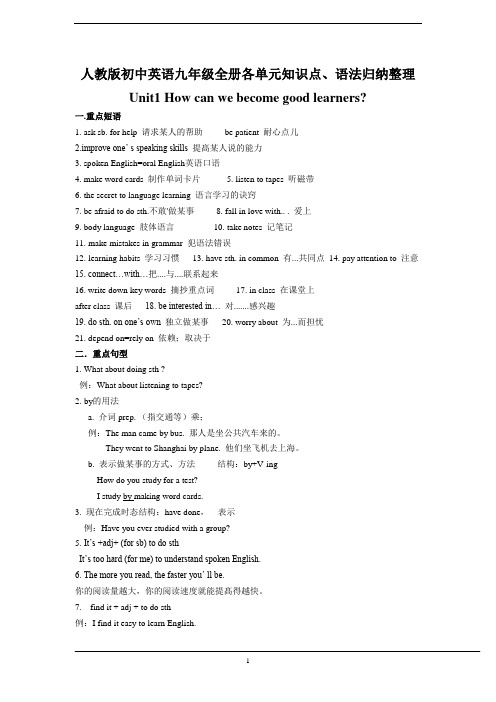
人教版初中英语九年级全册各单元知识点、语法归纳整理Unit1 How can we become good learners?一.重点短语1. ask sb. for help 请求某人的帮助be patient 耐心点儿2.improve one’ s speaking skills 提髙某人说的能力3. spoken English=oral English英语口语4. make word cards 制作单词卡片5. listen to tapes 听磁带6. the secret to language learning 语言学习的诀窍7. be afraid to do sth.不敢'做某事8. fall in love with.. . 爱上9. body language 肢体语言10. take notes 记笔记11.make mistakes in grammar 犯语法错误12.learning habits 学习习惯13. have sth. in common 有...共同点14. pay attention to 注意15. connect…with…把....与....联系起来16. write down key words 摘抄重点词17. in class 在课堂上after class 课后18. be interested in… 对.......感兴趣19. do sth. on one’s own 独立做某事20. worry about 为...而担忧21. depend on=rely on 依赖;取决于二.重点句型1. What about doing sth ?例:What about listening to tapes?2.by的用法a. 介词 prep. (指交通等)乘;例:The man came by bus. 那人是坐公共汽车来的。
九年级英语第一单元知识点归纳总结

九年级英语第一单元知识点归纳总结一、重点词汇1、 textbook n 教科书;课本2、 conversation n 交谈;谈话3、 aloud adv 大声地;出声地4、 pronunciation n 发音;读音5、 sentence n 句子6、 patient adj 有耐心的 n 病人7、 expression n 表情;表示;表达方式8、 discover v 发现;发觉9、 secret n 秘密;秘诀 adj 秘密的;保密的10、 grammar n 语法11、 repeat v 重复;重做12、 note n 笔记;记录 v 注意;指出13、 pal n 朋友;伙伴14、 physics n 物理;物理学15、 chemistry n 化学二、重点短语1、 work with friends 和朋友一起学习2、 make word cards 制作单词卡片3、 read aloud 大声朗读4、 practice conversations with 与练习对话5、 improve speaking skills 提高口语技能6、 give a report 作报告7、 at first 起初;起先8、 word by word 逐词地9、 be patient 有耐心10、 the secret to 的秘诀11、 because of 因为12、 fall in love with 爱上13、 look up 查阅;抬头看14、 take notes 做笔记15、 keep a diary 写日记三、重点句型1、 How do you study for a test? 你是怎样为考试而学习的?2、 I study by working with a group 我通过小组合作来学习。
3、 It's too hard to understand spoken English 英语口语太难懂了。
九年级英语单元知识点(必备12篇)

九年级英语单元知识点(必备12篇)九年级英语单元知识点(1)疑问词是疑问代词“who, whom, what, which, whose”和疑问副词“when, where, how, why ”。
此外,连接词“whether”也适用。
“疑问词+不定式动词”结构有何功用呢?其主要功用有下列五种:⑴当主语,如:When to hold the meeting has not yet beenWhere to live is aHow to cope with the rising cost of living becomes a daily discussion ⑵当宾语,如:We must know what to say at aHe could not tell whom toDo you know how to play bridge?⑶当补足语,如:The problem is where to find the financialThe question is who to⑷当名词同位语,如:Tom had no idea which book to readDo you have a rough impression how to do it?⑸当宾语补足语,如:Jim is not sure whose toMary and John are not certain whether to get married or适用于“疑问词+不定式动词”的动词包括:“know, see, decide, tell, ask, consider, discover, explain, forget, guess, hear, imagine, inquire, learn, remember, think, wonder, understand”等。
有点值得特别注意的是:当这结构当宾语时,它的作用等于名词分句,例如:I could not decide which dictonary to / I could not decide which dictionary I shouldJack did not know where to find such a good Jack did not know where he could find such a good有些动词,如“ask, show, tell, advise, inform, teach”等,可以先有个宾语,然后才接着加上适当的“疑问词+不定式动词”结构。
九年级英语各单元重点单词+词组+语法知识点总结

九年级英语全册各单元知识点总结Unit1How can we become good learners?一、短语:1.have conversation with sb.同某人谈话2.connect…with…把…和…连接/联系起来3.the secret to………的秘诀4.be afraid of doing sth./to do sth.害怕做某事5.look up查阅6.repeat out loud大声跟读7.make mistakes in在……方面犯错误8.get bored感到厌烦9.be stressed out焦虑不安的10.pay attention to注意;关注11.depend on取决于;依靠12.the ability to do sth.做某事的能力二、知识点:1.by+doing:通过……方式(by是介词,后面要跟动名词,也就是动词的ing形式);2.a lot:许多,常用于句末;3.aloud,loud与loudly的用法,三个词都与“大声”或“响亮”有关。
(1)aloud是副词,通常放在动词之后。
(2)loud可作形容词或副词。
用作副词时,常与speak,talk,laugh等动词连用,多用于比较级,须放在动词之后。
(3)loudly是副词,与loud同义,有时两者可替换使用,可位于动词之前或之后。
4.not…at all:一点也不,根本不,not经常可以和助动词结合在一起,at all则放在句尾;5.be/get excited about sth.:对…感到兴奋;6.end up doing sth:终止/结束做某事;end up with sth.:以…结束;7.first of all:首先(这个短语可用在作文中,使得文章有层次);8.make mistakes:犯错make a mistake犯一个错误;ugh at sb.:笑话;取笑(某人)(常见短语)10.take notes:做笔记/记录;11.native speaker说本国语的人;12.make up:组成、构成;13.deal with:处理、应付;14.perhaps=maybe:也许;15.go by:(时间)过去;16.each other:彼此;17.regard…as…:把…看作为…;18.change…into…:将…变为…;19.with the help of sb.=with one's help在某人的帮助下(注意介词of和with,容易出题)pare…to…:把…比作…compare with拿…和…作比较;21.instead:代替,用在句末,副词;instead of sth/doing sth:代替,而不是(这个地方考的较多的就是instead of doing sth,也就是说如果of后面跟动词时,要用动名词形式,也就是动词的ing形式)22.Shall we/I+do sth.?我们/我…好吗?23.too…to:太…而不能,常用的句型是too+形容词/副词+to do sth.Unit2I think that moon cakes are delicious!一、短语:1.the Lantern Festival元宵节2.the Dragon Boat Festival端午节3.the Water Festival泼水节4.remind sb.of使某人想起5.eat five meals a day一天吃五餐6.put on five pounds体重增加了五磅7.treat sb.with.用/以……对待某人8.be similar to...与.......相似9.end up最终成为/处于10.share sth.with sb.与……分享……11.as a result结果12.one...the other...(两者中的)一个…另一个…13.take sb.out for dinner带某人出去吃饭14.dress up乔装打扮15.haunted house鬼屋16.the beginning of new life新生命的开始二、知识点:1.宾语从句:(三大考点:引导词、时态和语序。
人教版九年级全一册英语Unit2单元语法知识点总结
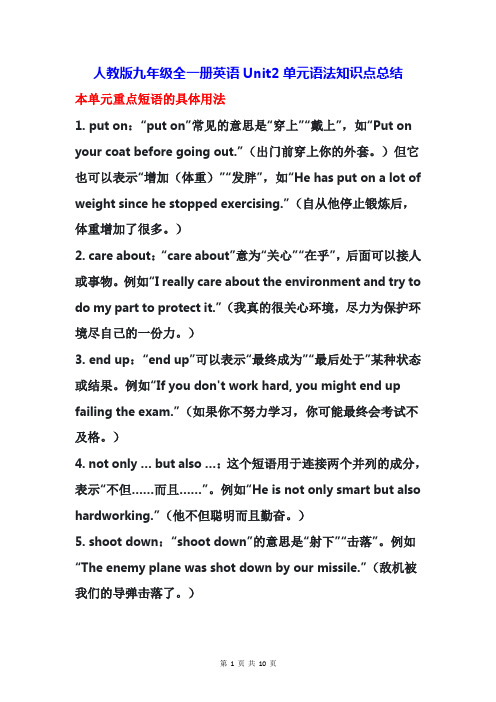
人教版九年级全一册英语Unit2单元语法知识点总结本单元重点短语的具体用法1. put on:“put on”常见的意思是“穿上”“戴上”,如“Put on your coat before going out.”(出门前穿上你的外套。
)但它也可以表示“增加(体重)”“发胖”,如“He has put on a lot of weight since he stopped exercising.”(自从他停止锻炼后,体重增加了很多。
)2. care about:“care about”意为“关心”“在乎”,后面可以接人或事物。
例如“I really care about the environment and try to do my part to protect it.”(我真的很关心环境,尽力为保护环境尽自己的一份力。
)3. end up:“end up”可以表示“最终成为”“最后处于”某种状态或结果。
例如“If you don't work hard, you might end up failing the exam.”(如果你不努力学习,你可能最终会考试不及格。
)4. not only … but also …:这个短语用于连接两个并列的成分,表示“不但……而且……”。
例如“He is not only smart but also hardworking.”(他不但聪明而且勤奋。
)5. shoot down:“shoot down”的意思是“射下”“击落”。
例如“The enemy plane was shot down by our missile.”(敌机被我们的导弹击落了。
)6. used to do:“used to do”表示过去常常做某事,但现在不再这样做了。
例如“I used to play basketball every day, but now I don't have time for it.”(我过去常常每天打篮球,但现在没有时间了。
九年级英语必考语法知识点整理归纳大全(复习重点)

九年级英语必考语法知识点整理归纳大全(复习重点)一. 宾语从句1. 宾语从句的含义在整个句子中做宾语的从句叫做宾语从句。
如:She knew that the teacher had seen the film.她知道这位老师看过这部电影。
(“that the teacher had seen the film”做knew 的宾语,同时又是由连接词that 引导的从句,所以它叫做宾语从句。
)2. 宾语从句的分类(1)动词宾语从句:顾名思义,它是位于动词后面的宾语从句。
例如:He asked whose handwriting was the best in our class.他问我们班上谁的书法最好。
(2)介词宾语从句:顾名思义,它是位于介词后面的宾语从句。
例如:I agree with what you said just now.我同意你刚才说的话。
(3)形容词宾语从句:顾名思义,它是位于形容词后面的宾语从句。
例如:I am afraid that I will be late. 恐怕我要迟到了。
3. 引导名词性从句的连接词(1)that:没有含义,在宾语从句中不做成分(2)whether/if:表示是否,在宾语从句中不做成分。
I don't know if /whether he still lives here after so many years. 我不知道这么多年后,他是否还住在这里。
(3)连接代词:what, which, who, whom, whose(在宾语从句中做主、宾、表和定语)连接副词:where, when, how, why(在宾语从句中做状语)The small children don't know what is in their stockings.(what 在宾语从句中做主语)这些小孩子不知道什么在他们的长筒袜里。
Could you tell me why you were late for the meeting this morning? (why 在宾语从句中做原因状语)你能告诉我为什么你今天早上开会迟到吗?4. 在做宾语从句的题目时应注意两点(1)时态①当主句是现在时态时,宾语从句可以根据需要使用任何时态。
- 1、下载文档前请自行甄别文档内容的完整性,平台不提供额外的编辑、内容补充、找答案等附加服务。
- 2、"仅部分预览"的文档,不可在线预览部分如存在完整性等问题,可反馈申请退款(可完整预览的文档不适用该条件!)。
- 3、如文档侵犯您的权益,请联系客服反馈,我们会尽快为您处理(人工客服工作时间:9:00-18:30)。
九年级英语知识点汇总Unit11. by + doing通过……方式如:by studying with a groupby 还可以表示:“在…旁”、“靠近”、“在…期间”、“用、”“经过”、“乘车”等如:I live by the river. I have to go back by ten o’clock.The thief entered the room by the window.The student went to park by bus.2. talk about 谈论,议论,讨论如:The students often talk about movie afterclass. 学生们常常在课后讨论电影。
talk to sb. === talk with sb. 与某人说话3. 提建议的句子:①What/ how about +doing sth.?如:What/ How about going shopping?②Why don’t you + do sth.?如:Why don’t you go shopping?③Why not + do sth. ? 如:Why not go shopping?④Let’s + do sth. 如: Let’s go shopping⑤Shall we/ I + do sth.?如:Shall we/ I go shopping?4. a lot 许多常用于句末如:I eat a lot. 我吃了许多。
5. too…to 太…而不能常用的句型too+adj./adv. + to do sth.如:I’m too tired to say anything. 我太累了,什么都不想说。
6. aloud, loud与loudly的用法三个词都与"大声"或"响亮"有关。
①aloud是副词,重点在出声能让人听见,但声音不一定很大,常用在读书或说话上。
通常放在动词之后。
aloud没有比较级形式。
如: He read the story aloud to his son.他朗读那篇故事给他儿子听。
②loud可作形容词或副词。
用作副词时,常与speak, talk,laugh等动词连用,多用于比较级,须放在动词之后。
如:She told us to speak a little louder. 她让我们说大声一点。
③loudly是副词,与loud同义,有时两者可替换使用,但往往含有令人讨厌或打扰别人的意思,可位于动词之前或之后。
如:He does not talk loudly or laugh loudly in public. 他不当众大声谈笑。
7. not …at all 一点也不根本不如:I like milk very much. I don’t like coffee at all. 我非常喜欢牛奶。
我一点也不喜欢咖啡。
not经常可以和助动词结合在一起,at all 则放在句尾8. be / get excited about sth.=== be / get excited about doing sth. === be excited to do sth. 对…感兴奋如:I am / get excited about going to Beijing.===I am excited to go to Beijing. 我对去感到兴奋。
9. ①end up doing sth 终止做某事,结束做某事如:The party ended up singing. 晚会以唱歌而结束。
②end up with sth. 以…结束如:The party ended up with her singing. 晚会以她的歌唱而告终。
10. first of all 首先. to begin with 一开始later on 后来、随也、而且(用于肯定句)常在句子的中间也(用于否定句)常在句末(用于肯定句) 常在句末12. make mistakes 犯错如:I often make mistakes. 我经常犯错。
make a mistake 犯一个错误如: I have made a mistake.我已经犯了一个错误。
13. laugh at sb. 笑话;取笑(某人)如:Don’t laugh at me!不要取笑我!14. take notes 做笔记,做记录15. enjoy doing sth .喜欢做…乐意做…如:She enjoys playing football. 她喜欢踢足球。
enjoy oneself 过得愉快如:He enjoyed himself. 他过得愉快。
16. native speaker 说本族语的人17. make up 组成、构成18. one of +(the+ 形容词比较级)+名词复数形式…其中之一如: She is one of the most popular teachers.她是最受欢迎的教师之一。
19. It’s +形容词+(for sb. ) to do sth. (对于某人来说)做某事…如:It’s difficult (for me ) to study English.对于我来说学习英语太难了。
句中的it 是形式主语,真正的主语是to study English20. practice doing 练习做某事如:She often practice speaking English. 她经常练习说英语。
21. decide to do sth. 决定做某事如:LiLei has decided to go to BeiJing . 雷已经决定去。
22. unless 假如不,除非引导条件状语从句如:You will fail unless you work hard..假如你不努力你会失败。
I won’t write unless he writes first. 除非他先写要不我不写23. deal with 处理如:I dealt with a lot of problem.24. worry about sb./ sth. 担心某人/ 某事如:Mother worried about his son just now.妈妈刚才担心他的儿子。
25. be angry with sb. 对某人生气如:I was angry with her. 我对她生气。
26. perhaps === maybe 也许27. go by (时间) 过去如: Two years went by. 两年过去了。
28. see sb. / sth. doing看见某人正在做某事强调正在发生see sb. / sth. do看见某人在做某事如:如: She saw him drawing a picture in the classroom.她看见他正在教室里画画。
29. each other 彼此30. regard… as …把…看作为….如:The boys regarded Anna as a fool. 这些男孩把安娜看成傻瓜。
31. too many 许多修饰可数名词如:too many girlstoo much 许多修饰不可数名词如:too much milkmuch too 太修饰形容词如:much too beautiful32. change…into…将…变为…如:The magician changed the pen into a book.这个魔术师将这本书变为一本书。
33. with the help of sb. == with one’s help 在某人的帮助下如:with the help of LiLei == with LiLei’s help在雷的帮助下34. compare … to …把…与…相比如:Compare you to Anna, you are lucky.你和安娜相比,你是幸运的。
如:Last summer I went to Beijing. This year I’m going to Shanghai instead.去年夏天我去, 今年我将要去。
I will go instead of you. 我将代替你去。
He stayed at home instead of going swimming.他呆在家里而不是去游泳。
九年级英语Unit21. used to do sth. 过去常常做某事否定形式:didn’t use to do sth. / used not to do sth.如:He used to play football after school. 放学后他过去常常踢足球。
Did he use to play football? Yes, I did. No, I didn’t.He didn’t use to smoke. 他过去不吸烟。
2. 反意疑问句①肯定述句+否定提问如:Lily is a student, isn’t she?Lily will go to China, won’t she?②否定述句+肯定提问如:She doesn’t come from China, does she?You haven’t finished homework, have you?③提问部分用代词而不用名词 Lily is a student, isn’t she?④述句中含有否定意义的词,如:little, few, never, nothing, hardly等。
其反意疑问句用肯定式。
如:He knows little English, does he? 他一点也不懂英语,不是吗?They hardly understood it, did they?他们几乎不明白,不是吗?3. play the piano 弹钢琴4. ①be interested in sth. 对…感兴趣②be interested in doing sth. 对做…感兴趣如:He is interested in math, but he isn’t interested in speaking English. 他对数学感兴趣,但是他对说英语不感兴趣。
5. interest ed adj. 感兴趣的,指人对某事物感兴趣,往往主语是人interest ing adj.有趣的,指某事物/某人具有趣味,主语往往是物6. still 仍然,还用在be 动词的后面如:I’m still a student.用在行为动词的前面如:I still love him.7. the dark 天黑,晚上,黑暗8. 害怕…be terrified of sth.如:I am terrified of the dog.be terrified of doing sth.如:I am terrified of speaking.9. on 副词,表示(电灯、电视、机械等)在运转中/打开,其反义词off. with the light on 灯开着10. walk to somewhere 步行到某处 walk to school 步行到学校11. spend 动词,表示“花费金钱、时间”①spend…on sth. 在某事上花费(金钱、时间)②spend…doing sth.花费(金钱、时间)去做某事如:He spends too much time on clothes. 他花费太多的时间在衣着He spend 3 months building the bridge.他花费了三个月去建这座桥。
